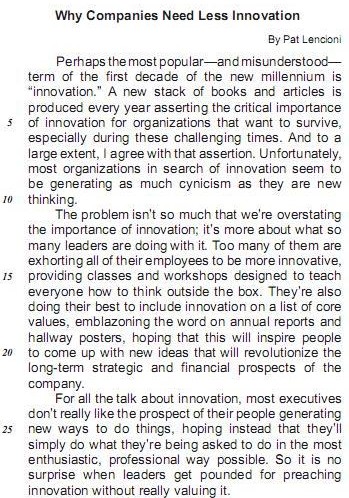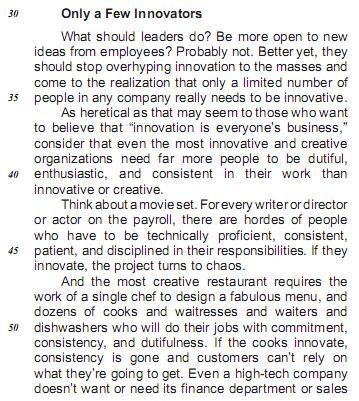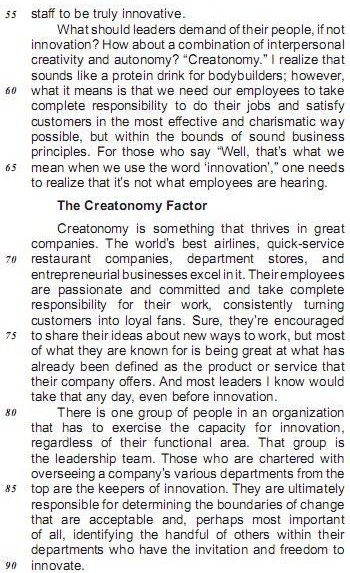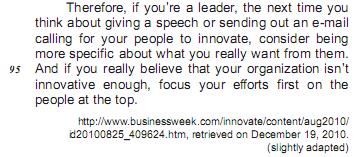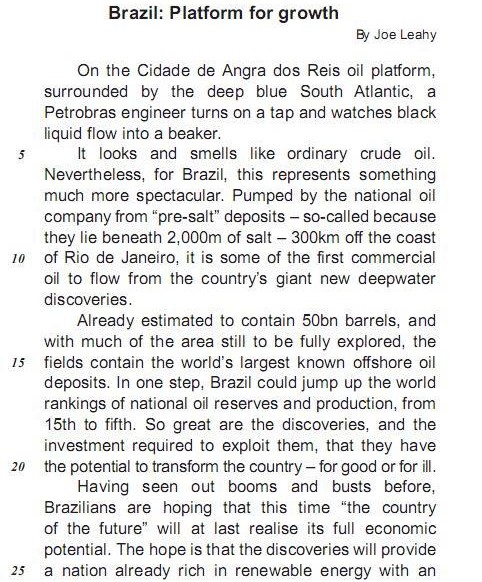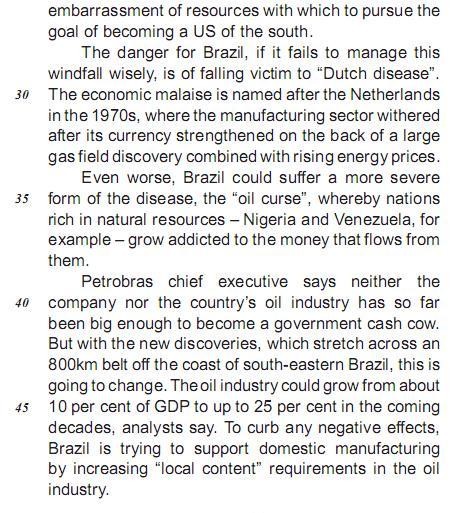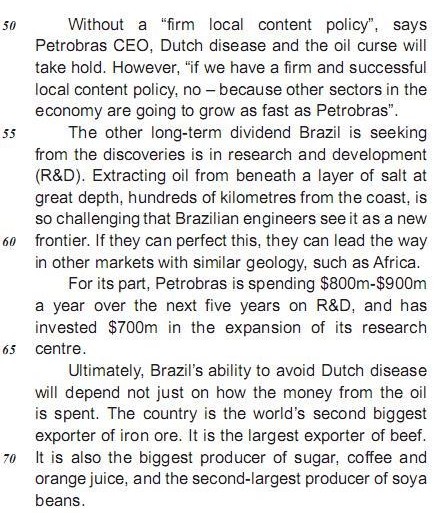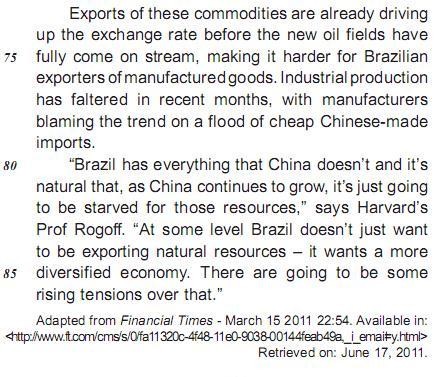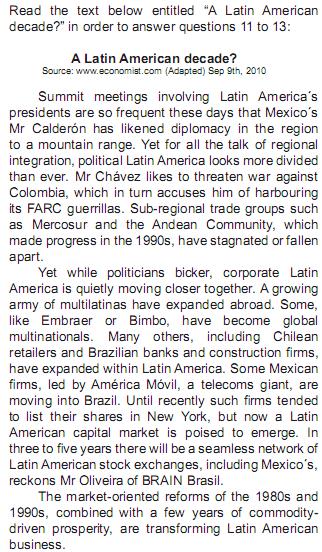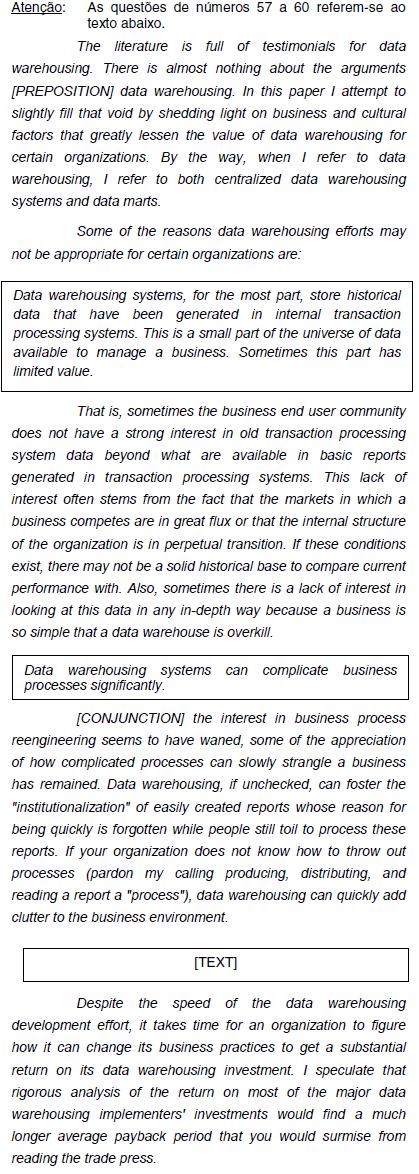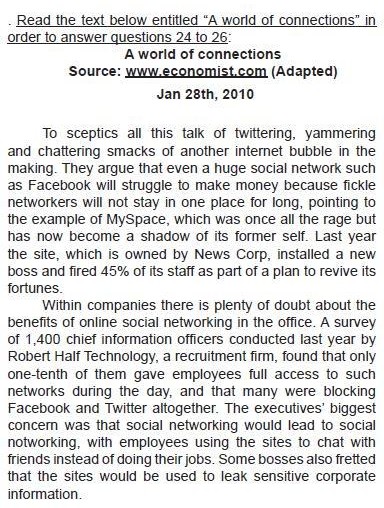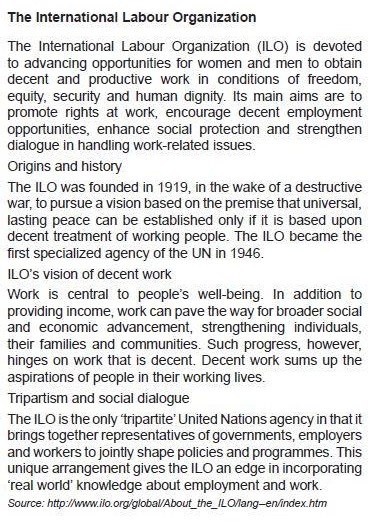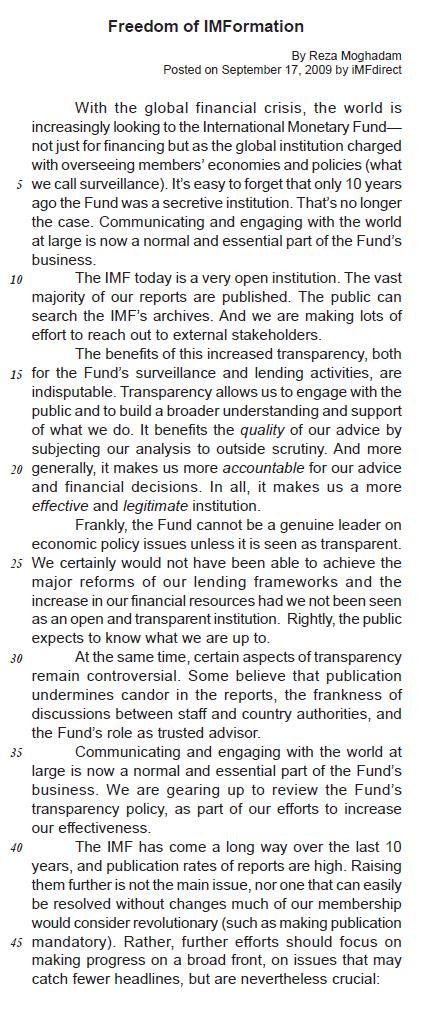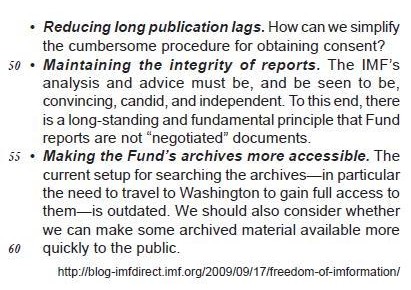According to paragraphs 5 and 6 ( lines 28-38 ), Dutch disease is a
According to the text, there will be a seamless network of Latin American stock exchanges, which means this network will
Read the text below entitled 10 Ways to Protect Your
Privacy Online in order to answer questions 17 to
20:
10 Ways to Protect Your Privacy Online
Source: www.newsweek.com (Adapted) Oct, 22nd 2010
Up to a couple of years ago, I used to say that
the average person could protect his or her privacy
on the Web. Even as the founder of an online
reputation-management company, I believed it was
possible so long as you were willing to commit some
time doing it. Today, I tell people this: the landscape
of personal data mining and exploitation is shifting
faster than ever; trying to protect your online privacy
is like trying to build your own antivirus software
really, really dif?cult. But whether or not you have the
time (or money) to invest in the pros, there are a few
simple steps we can all take to reduce the risk to our
private data.
1. Do not put your full birth date on your social-
networking pro?les.
Identity thieves use birth dates as cornerstones
of their craft. If you want your friends to know your
birthday, try just the month and day, and leave out
the year.
2. Use multiple usernames and passwords.
Keep your usernames and passwords for social
networks, online banking, e-mail, and online shopping
all separate. Having distinct passwords is not enough
nowadays: if you have the same username across
different Web sites, your entire life can be mapped
and re-created with simple algorithms.
3. Shred.
If you are going to throw away credit-card offers, bank
statements, or anything else that might come in hard
copy to your house, rip them up into tiny bits ?rst.
According to the author, when throwing away credit card offers or bank statements, one should
The word these in These will either become increasingly scarce refers to
The text states that the number of people who seek for renewable sources of energy is _________
The expression such as in they should consider some points such as indicates that some important aspects:
For most parents nowadays, teaching children to eat well is __________.
According to paragraph 2, some bosses also worried that through the sites sensitive corporate information would be
Companies in the rich world are confronted with a rapidly
ageing workforce. Nearly one in three American workers
will be over 50 by 2012, and America is a young country
compared with Japan and Germany. China is also ageing
rapidly, thanks to its one-child policy. This means that
companies will have to learn how to manage older workers
better.
Most companies are remarkably ill-prepared. There was a
fl icker of interest in the problem a few years ago but it was
snuffed out by the recession. The management literature
on older workers is a mere molehill compared with the
mountain devoted to recruiting and retaining the young.
Companies are still stuck with an antiquated model for
dealing with ageing, which assumes that people should
get pay rises and promotions on the basis of age. They
have dealt with the burdens of this model by periodically
"downsizing" older workers or encouraging them to take
early retirement. This has created a dual labour marketfor
older workers, of cosseted insiders on the one hand and
unemployed or retired outsiders on the other.
But this model cannot last. The number of young people,
particularly those with valuable science and engineering
skills, is shrinking. And governments are raising retirement
ages and making it more diffi cult for companies to shed
older workers, in a desperate attempt to cope with their
underfunded pension systems.
Feb 4th 2010 | From The Economist print edition [adapted]
According to the text, businesses
Minister calls for wider fl exible working rights
British government ministers are considering giving all
employees the right to ask for fl exible working hours "from
the beginning" of a new job as part of plans to encourage a
fundamental shift in working habits.
The Work and Pensions Secretary, Yvette Cooper, says her
offi ce is working with employers and organisations such as
the federation of small businesses to draw up new ways of
supporting men as well as women and non-parents as well
as parents working more fl exible hours.
The current rules are limited to parents of children under 16
and carers, and Cooper wants to extend them. "You want
people to offer fl exible working from the beginning and
we need to look again at how the legislation can support
different ways of doing that," she said.
"There will be some areas where it's not possible to fi t
round particular school hours or particular things where the
nature of the businessmakes it hard - but what you need
is the cultural change for everybody to think differently."
Cooper's proposals come as the government announced
that fathers will be given the right to six months' paternity
leave.
There will be a legal right to take the mother's place at
home for the last three months of a nine-month maternity
break; they would receive £123 a week in statutory pay.
Fathers would then be entitled to take a further three
months' unpaid leave. The move was criticised by some
business leaders.
(From: The Guardian, Friday 29 January 2010 -slightly adapted)
The Work and Pensions Secretary
Text 2
Source: The New York Times November 11, 2009 [slightly adapted]
Trucks, Trains and Trees
By THOMAS L. FRIEDMAN
No matter how many times you hear them, there are some statistics that just bowl you over. The one that always stuns me is this: Imagine if you took all the cars, trucks, planes, trains and ships in the world and added up their exhaust every year. The amount of carbon dioxide, or CO2, all those cars, trucks, planes, trains and ships collectively emit into the atmosphere is actually less than the carbon emissions every year that result from the chopping down and clearing of tropical forests in places like Brazil, Indonesia and the Congo. We are now losing a tropical forest the size of New York State every year, and the carbon that releases into the atmosphere now accounts for roughly 17 percent of all global emissions contributing to climate change. [.]
"You need a new model of economic development - one that is based on raising people's standards of livingby maintaining their natural capital, not just by converting that natural capital to ranching or industrial farming or logging," said José María Silva, a conservation expert. Right now people protecting the rainforest are paid a pittance - compared with those who strip it - even though we now know that the rainforest provides everything from keeping CO2 out of the atmosphere to maintaining the fl ow of freshwater into rivers.
The good news is that Brazil has put in place all the elements of a system to compensate its forest-dwellers for maintaining the forests. Brazil has already set aside 43 percent of the Amazon rainforest for conservation and for indigenous peoples. Another 19 percent of the Amazon, though, has already been deforested by farmers and ranchers.
The main message of the fi rst paragraph is that

